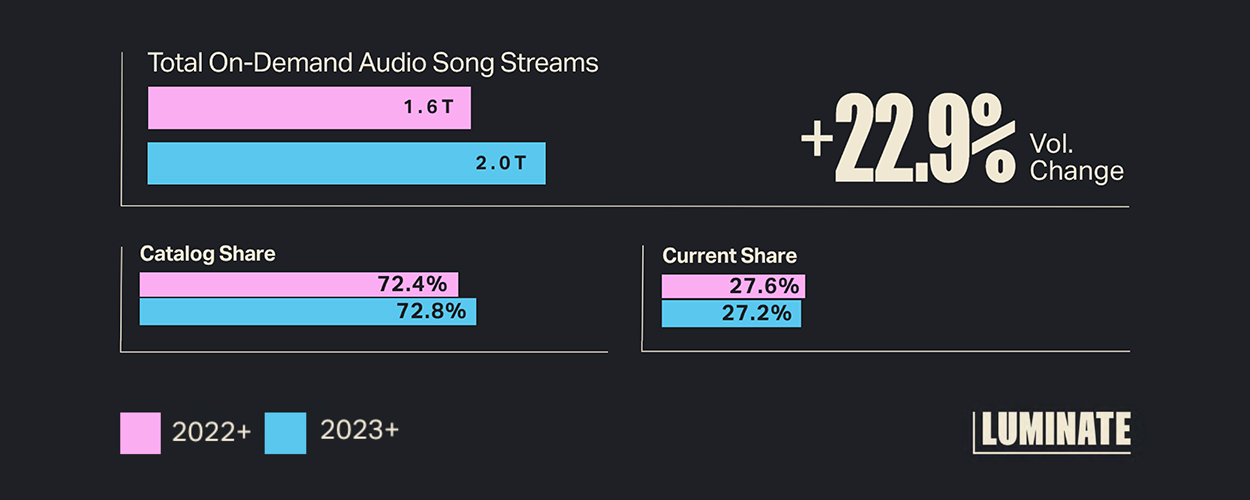This website uses cookies so that we can provide you with the best user experience possible. Cookie information is stored in your browser and performs functions such as recognising you when you return to our website and helping our team to understand which sections of the website you find most interesting and useful.
Business News CMU Digest
CMU Digest 16.07.23: Luminate stats, regulating AI, The Leadmill, FAC, ECSA
By Chris Cooke | Published on Sunday 16 July 2023

The key stories from the last week in the music business…
Music data company Luminiate published its ‘Midyear Music Report’, confirming that music consumption continues to grow. By the end of June, two trillion audio streams had been delivered across all the digital platforms worldwide since the start of the year, a 22.9% increase on the same period last year. Meanwhile in the US physical product sales are also increasing, with vinyl sales specifically up 21.7% so far this year. The report also revealed that, in the US, catalogue music – which Luminate defines as anything released more than eighteen months ago – now accounts for 72.8% of consumption, up from 72.4% last year. And in terms of new music, “on average, 112,000 new music tracks are being added to streaming services each day, representing a 28% increase from 93,400 per day in 2022”. [READ MORE]
The music industry again set out its priorities for how lawmakers should seek to regulate artificial intelligence, in both the US and the UK. Universal Music’s General Counsel Jeff Harleston spoke at a hearing before the US Senate Judiciary Committee. Meanwhile cross-sector trade group UK Music sent a letter to Culture Secretary Lucy Frazer. Both stressed that the music industry recognises the opportunities created by AI – and especially generative AI – but added that AI companies need to respect copyright and other creator rights. Both insisted that when AI companies train their technologies with existing songs and recordings, licences must be sought from the relevant copyright owners. They also stressed that the law must enable artists to control the exploitation of their voices or identities by AI technologies. That protection will likely be provided by so called ‘publicity rights’, although they don’t currently exist in the UK. Both Harleston and UK Music called for stronger legal protection in this domain. [READ MORE]
The Electric Group confirmed that it has begun legal action against the current management team at Sheffield venue The Leadmill. The live music firm – which already operates venues in London, Bristol and Newcastle – bought the building that houses The Leadmill in 2017 and confirmed last year that it now plans to directly manage the space. To that end, in March 2022 it gave the current management team a year to vacate the premises. However, that team is still in situ and has been running a high profile campaign, backed by many artists, calling on their landlord to change its position and let them stay. For its part, The Electric Group has dubbed that campaign “toxic”, claiming that the current team is misleading people into thinking that the venue is set to close, when the company plans to continue operating a venue in the building. The legal action that seeks to formally evict the current management team should reach court next year. [READ MORE]
The UK’s Featured Artists Coalition ramped up its 100% Venues campaign, which calls on venues to allow artists to sell merchandise at their shows without being charged any commission. The campaign was originally launched in January 2022 and the FAC now manages a directory of all the UK venues that have committed to never charge any commissions on merch sales. This week the FAC set out four principles it would like the entire live sector to embrace, including the bigger venues, some of which argue that their current economic model depends on a cut of merch income. Those principles include that support acts should never be subject to commissions; that artists and their teams should be able to staff merch stalls at their shows if they so wish; that any merch commissions that will be charged should be clearly declared to an artist upfront; and that venues should be willing to negotiate on those commissions on a show by show basis. [READ MORE]
The European Composer & Songwriter Alliance published a new report on streaming ahead of a discussion about the digital music sector in the European Parliament this coming week. It raises a number of issues with the economics of streaming from a songwriter perspective and recommends measures the industry and lawmakers could implement to address those issues. That includes how streaming revenues are allocated to individual works each month, and how money is then split between the recording rights and the song rights. It also calls for more work to be done around music rights data, to increase the efficiency and accuracy of payments to songwriters, and argues that there needs to be more transparency in relation to the algorithms employed by the streaming services. [READ MORE]





